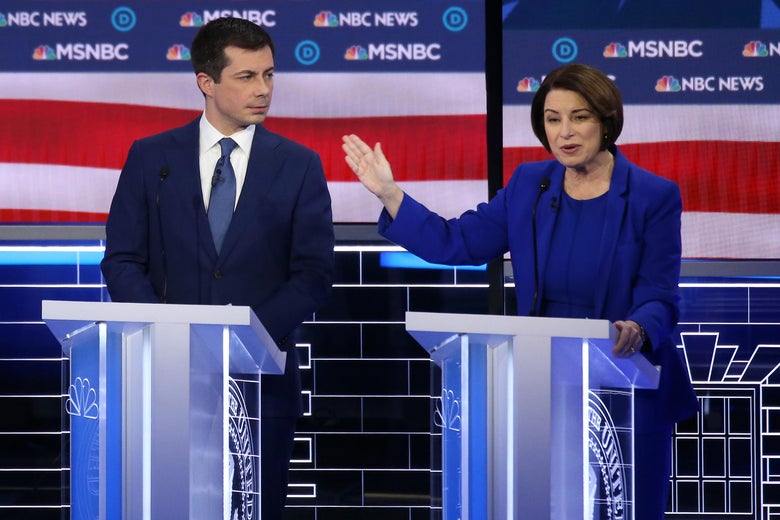
Former presidential candidates Pete Buttigieg and Amy Klobuchar at the Democratic presidential primary debate in Las Vegas on Feb. 19, 2020.
Mario Tama/Getty Images
The Democratic presidential race has shifted in the days after South Carolina’s primary, as Tom Steyer, Pete Buttigieg, and Amy Klobuchar dropped out in quick succession. But their departures so close to Super Tuesday creates a complication: their names are still on the ballot, and many early voters have already cast meaningless votes for them.
California, for example, has 415 delegates on the line on Tuesday. It has also successfully encouraged people to vote by absentee ballot. In the 2018 primary election, 67 percent of all votes were cast outside of an in-person polling place, according to the Los Angeles Times. This year, officials have already received 20 percent of the mailed-out ballots, which is likely a hefty portion of the state’s votes. A number of those will be for Steyer, Buttigieg, and Klobuchar—as well as Andrew Yang, who dropped out after early voting began.
So, what happens to the early votes in California and elsewhere when a candidate drops out?
Can early voters re-do their ballots?
In most states, no. In some states, if you can beat your own absentee ballot to the polling place, you might be OK. Michigan, which votes next week, specifically allows you to come in and “spoil” your ballot, negating the earlier and requesting a new one. Minnesota allowed people to switch votes, but the deadline for that passed last week, before Buttigieg and Klobuchar had announced their decisions.
According to the Times, voters should be careful: if Californians cast a ballot at their polling place in hopes it will counteract their first ballot, they run the risk of violating state election law.
What then happens to those early votes?
They’re treated as if the candidate is still in the running. The votes are counted and delegates are apportioned the same for candidates in the race and those who suspended their campaigns. It’s unlikely the candidates who have dropped out will seriously compete for state-wide delegates, but it’s possible that in a state with heavy early voting, they could steal a delegate or two by winning 15 percent in a particular region.
Would this affect the math when we’re thinking about thresholds for the other candidates?
Yes. To win delegates for the convention, candidates need to receive 15 percent or more of the votes in each contest (these are a combination of state-wide races and individual regional contests, usually mapped out by congressional districts). Ultimately, having fewer candidates will make it much easier for the remaining ones to meet that 15 percent threshold. If Klobuchar’s and Buttigieg’s moderate voters shift to Biden, then that makes it likely Biden will win more delegates. But in a hypothetical contest in which Biden had 14 percent and Buttigieg had 2, it’s not like Buttigieg’s votes would be redistributed—Buttigieg would keep his (and ultimately lose it, having failed to reach 15 percent), and Biden would still fall short of qualifying for delegates in this scenario.
What will happen to the pledged delegates that Buttigieg and Klobuchar have already racked up?
For the most part, the candidates’ pledged delegates are still pledged to them for the first ballot at the convention. A handful of states, however, have provisions that allow the pledged delegates for candidates who withdraw to be released to vote for another candidate, either when that candidate drops out or when that candidate explicitly allows it.
If their delegates are released, who gets to decide who they vote for?
The rules give Buttigieg and Klobuchar some extra power. Since delegates are chosen from people known to be loyal supporters of their candidate, they’re likely to listen when that candidate tells them who to pick. That being said, a Buttigieg delegate is not obligated to choose Biden if that’s what the former mayor tells him to do.
Readers like you make our work possible. Help us continue to provide the reporting, commentary and criticism you won’t find anywhere else.
Join Slate Plusfrom Slate Magazine https://ift.tt/2Tjjwuh
via IFTTT
沒有留言:
張貼留言